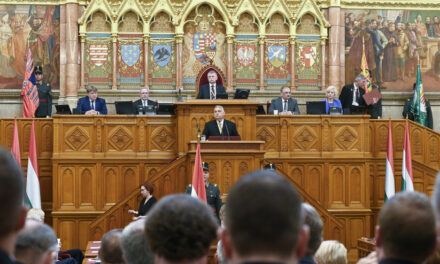Three important admonitions came up in the discussion of almost every issue, one is to bring narratives under strict control, the other is to fight against "disinformation", and finally the third is to urge "tangible" solutions - writes László Bogár in Magyar Hírlap .
Last week, the world's visual elite gathered again in Davos. Because what is visible in our world mostly shows itself only to cover up the real sight, that is, to distract attention from what is "invisible", what's more, it doesn't actually exist, at least for people like me who dabble in conspiracy theories. Davos is just one, although perhaps the most self-centered global conversational network of the last few years, with the aim of clarifying what the prevailing social reality is through the "non-existent" force that actually controls the world.
In other words, what should and should be thought about by someone who has a good life.
What and what to think about is determined on the one hand by the power of thematization (in other words, what the "theme") is and on the other hand by the power of interpretation. form an image of reality, we must realize that all our perceived knowledge comes from the media, that is, from an "intermediary". And the media does not reveal reality to us, but tells a story about reality, which either has something to do with actual reality or it doesn't. And since deciding this is beyond our competence, we could not be more vulnerable than this.
Davos and other global conversational networks like it serve to distribute the dominant narratives of this gigantic “reality factory” to the world's inhabitants.
The World Economic Forum therefore, as always during the past half century, tried to fix the dominant global narrative mode as the only possible world interpretation logic. The forum's five basic topics focused on real issues, since energy and climate as an ecological challenge, the global economic crisis, technology, the social and cultural crisis and, finally, the global war conflict are really determinants of the world of our time. But the fact that the narrative methods describing these issues are hardly suitable for a dialogue that forms the basis of any solution was shown in the most dramatic way by the treatment of the issue of war. The title of the fifth topic was "cooperation and dialogue in a fragmented world", the importance of which obviously does not need to be proven.
But how they envisioned the dialogue and cooperation in Davos in such a way as to exclude any presence of Russia in the first place is quite difficult to interpret.
So, it would be quite difficult to support with arguments how to "dialogue" and cooperate in a conflict area that is developing into a global crisis, which undoubtedly looks like a Russian-Ukrainian war on the playing surface. Perhaps that is precisely why the organizers of the World Economic Forum did not even try to justify this, they were content with the fact that the Ukrainian president, the first lady and one of the president's close colleagues could address the standing and applauding participants of the plenary session, thus declaring the constructive dialogue "closed".
Perhaps it is not unfounded to believe that, if global liberal democracy and tolerance allow roughly this much freedom of speech, then the discussion of other vital issues also took place embedded in a similar framework of interpretation.
Since I tried to follow the discussions online in Davos all week, I can only confirm this assumption. Three important admonitions came up during the discussion of almost every issue, one is the strict control of narratives, the second is the fight against "disinformation", and finally the third is the urging of "tangible" solutions. If we combine these three efforts, it is clear that the "non-existent" masters of the world not only do not strive for real dialogue and cooperation, but on the contrary, they now see the time to impose control and obedience at a level that they could not even understand until now. the world.
And the main tool for this is, of course, technology itself, which was on the forum's agenda as one of the most important world problems, and for good reason.
Before proceeding to the outline of this question, I think it is important to emphasize that technology, although it appears to represent the world of material-physical structures, is actually spiritual energy. And since this spiritual energy self-excitingly expands itself exponentially and can be understood by fewer and fewer people, all the conditions for the total control of the world and total obedience are ready.
For the "non-existent" masters of the world, this means that there are now many different methods and countless combinations of these methods available to reduce the number of humanity to a fraction.
Despite all our legitimate feelings about this, it does not hurt to face the fact that all this is not done to humanity out of "evil". But because the mass of people they have turned into a medium will no longer be needed either as labor animals or as consumer animals within a century at the most. Global technological networks based on artificial intelligence make productive human work almost entirely redundant, and since productivity converges to infinity, prices tend to zero, that is, the system of production, distribution and consumption created in modernity over the past centuries and the descriptive economic theories become incomprehensible. Behind Davos's nonsense and dilemmas was this dark vision.
Featured image: Tibor Vermes / Democrat













